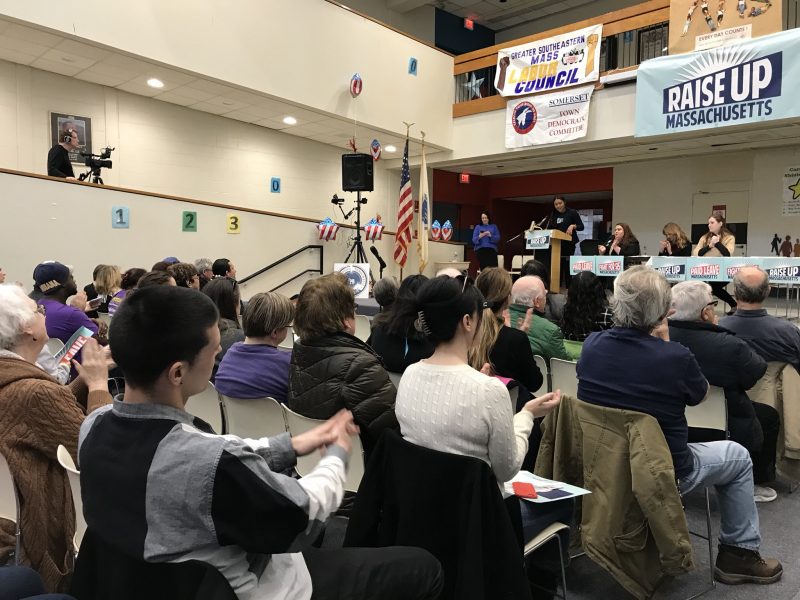Community
Group holds Fall River/New Bedford briefing for paid family and medical leave, $15 minimum wage bills

New Bedford, MA – South Coast legislators were met with a message Saturday from the voters gathered at the Carney Academy in New Bedford for a Fall River/New Bedford briefing on paid leave and a $15 minimum wage: “Pass These Bills!”
At the community briefing hosted by the Raise Up Massachusetts coalition, members of local community organizations, faith groups, and labor unions including the Coalition for Social Justice, Fall River Educators Association, Greater SE MA Labor Council, Mass Teachers Association, New Bedford Dems, SE MA Building Trades, 1199SEIU, Somerset Dems, and United Interfaith Action, spoke with South Coast area legislators about an increase in the state’s minimum wage to $15 an hour by 2022 and the creation of a paid family and medical leave program for all Massachusetts workers.
“These issues impact so many people in our communities. Many are struggling to get by, living paycheck to paycheck, and making hard decisions on whether to pay the rent or put food on the table, whether to buy their medicine or pay their bills, whether to take care of a loved one or keep the job they need to pay their bills,” said Anabel Santiago, a Regional Coordinator with the Coalition for Social Justice. “We are here today to let our legislators know that it’s time to take action and pass paid leave and $15 minimum wage legislation that is inclusive of all Massachusetts workers!”
The briefing is part of a statewide tour pushing for passage of paid leave and a $15 minimum wage this spring, with events occurring in the South Coast, Springfield, Lawrence, Worcester, Boston, the North Shore, and Brockton throughout March and early April. Members of the Raise Up Massachusetts coalition across the state are also calling legislators, collecting postcards from supporters, and otherwise engaged in an all-out effort to pass the bills this spring.
“By using money saved from three years of waitressing after school, help from my mother, and by working through college, I was able to go to community college and become a state certified early education teacher. But even with a college education and a state certification, I had a career that paid minimum wage,” said Bethany Santos-Fauteux of New Bedford. “Colleagues of mine ended up in the same position as me. Emergency medical technicians, CNAs, medical assistants – and many left with huge debt on top.”
“Having a $15 minimum wage would mean that my professional friends, and myself, might be able to pay off those loans, and pay all of our bills in the same month, instead of choosing which ones to let go because we just can’t afford it. Perhaps we would be able to go shopping, go out to eat, support small businesses, and one day think about buying a new car or maybe even a home,” Santos-Fauteux continued. “I just want what was intended when the minimum wage was created- a chance to not live in poverty, a chance to support my family. To finally breathe again.”
In New Bedford and Fairhaven, 22,855 workers (46% of workers in the area) would see their wages rise if the minimum wage is increased to $15 per hour, according to the Massachusetts Budget and Policy Center. In Fall River and Somerset, 16,582 workers (42% of workers in the area) would see their wages rise, and in other parts of southern Bristol and Plymouth counties, 30% of workers would see their wages rise. 87 percent of workers in New England don’t have access to paid family and medical leave today, and almost all Massachusetts workers would be eligible for it under Raise Up Massachusetts’ proposal.
“I know firsthand that paid family and medical leave can be the difference between financial hardship and instability or safety and security when life’s emergencies arise,” said Erica Scott of Fall River. “In 2015, my then-husband Jorge was in a car accident that left him temporarily unable to work. It wasn’t his fault, but because he was one of the 1.2 million workers in our state without paid leave, he went from having a good job to unemployed. I struggled to support us on one income, and I couldn’t take time off to drive him to his many medical appointments.”
“The worst part is his employer would have safeguarded his job if he had only worked across the state line in Rhode Island. Because he worked in New Bedford, however, he was out of luck—just because our state has yet to protect workers like Rhode Island has,” Scott continued. “That’s why I’m asking you to pass paid leave in the legislature this spring. Every worker deserves time to recover from a serious injury, care for an ill family member, or bond with a new baby without the threat of termination and financial hardship.”
Last fall, the Raise Up Massachusetts coalition of community organizations, religious groups, and labor unions collected a total of 274,652 signatures to qualify paid leave and $15 minimum wage questions for the ballot, all without using paid signature gathering companies. The coalition collected 139,055 signatures for a $15 minimum wage and 135,597 for paid family and medical leave, well beyond the required 64,750 signatures for each petition.
Now that signatures are collected, members of the coalition are asking the Legislature to pass the bills before the June 2018 deadline to act. At that point, ballot question proponents must collect another 10,792 signatures to place the questions on the November 2018 ballot.
The Raise Up Massachusetts coalition is also behind the Fair Share Amendment, which would create an additional tax of four percentage points on the portion of a person’s annual income that is above $1 million. The Amendment would dedicate the new revenue generated by the tax, approximately $1.9 billion in 2019 dollars, to investments in transportation and public education. The Fair Share Amendment is already fully qualified for the 2018 ballot, because it is a constitutional amendment which followed a lengthier path to the ballot.
Background: Paid Family and Medical Leave
Raise Up Massachusetts’ paid leave legislation (H.2172/S.1048) would create a Paid Family and Medical Leave Insurance Program for Massachusetts workers, providing up to either 12 or 16 weeks of job-protected paid leave to care for a seriously ill or injured family member, to care for a new child, or to meet family needs arising from a family member’s active duty military service (family leave); and up to 26 weeks of job-protected paid leave to recover from a worker’s own serious illness or injury (medical leave), or to care for a seriously ill or injured service member.
The question prohibits employer retaliation against workers who take time off under these conditions, and workers taking paid leave would receive partial wage replacement equal to a percentage of their average weekly wages, with a maximum weekly benefit of either $650 or $1,000. Benefits would be funded through employer contributions to the new Family and Medical Leave Trust Fund, and employers could require employees to contribute up to 50% of the trust fund contributions.
While the United States is the only developed nation that does not offer paid time off after the birth of a child, California, New York, Rhode Island, and New Jersey all have paid family and medical leave, and both workers and businesses report positive effects. Because employees on leave receive their benefits from a state trust fund, businesses can afford to hire temporary replacement workers with the money they would otherwise use to pay the employee taking leave. Six years after California’s law was implemented, 89 to 99 percent of employers reportedthat paid family and medical leave had either a “positive effect” or “no noticeable effect” on productivity, profitability/performance, turnover, and employee morale.
Background: $15 Minimum Wage
Raise Up Massachusetts’ $15 minimum wage legislation (H.2365/S.1004) would raise the Massachusetts minimum wage, currently $11 an hour, by $1 each year over four years until it is $15 an hour in 2021. The minimum wage would then be adjusted each year to rise at the same rate as the cost of living.
Increasing the minimum wage to $15 by 2022 would raise the wages of roughly 943,000 workers, or 29 percent of the state’s workforce, according to a report by the Massachusetts Budget and Policy Center. 90 percent of workers who would be affected are over 20 years old or older, 56 percent are women, and 55 percent work full-time. Workers who are paid low wages include highly skilled professions, like nursing assistants, childcare providers, paramedics, and educators.
Business for a Fair Minimum Wage, a network of business owners and executives who believe a fair minimum wage makes good business sense, has released a statement signed by more than 250 Massachusetts business owners and executives who support gradually raising the minimum wage to $15 an hour by 2021. Raise Up Massachusetts has also released a statement signed by 90 Massachusetts economists in support of the minimum wage increase.
Raise Up Massachusetts’ legislation would also increase the sub-minimum wage for tipped workers over 8 years until it is equal to the regular minimum wage.





You must be logged in to post a comment Login